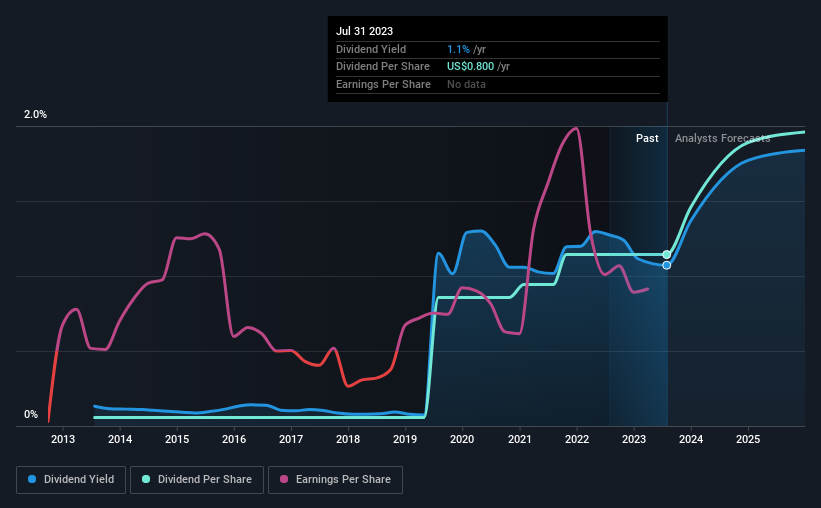- United States
- /
- Diversified Financial
- /
- NYSE:VOYA
Voya Financial's (NYSE:VOYA) Shareholders Will Receive A Bigger Dividend Than Last Year

The board of Voya Financial, Inc. (NYSE:VOYA) has announced that it will be increasing its dividend by 100% on the 27th of September to $0.40, up from last year's comparable payment of $0.20. This takes the annual payment to 1.1% of the current stock price, which is about average for the industry.
See our latest analysis for Voya Financial
Voya Financial's Dividend Is Well Covered By Earnings
Unless the payments are sustainable, the dividend yield doesn't mean too much. Before making this announcement, Voya Financial was easily earning enough to cover the dividend. As a result, a large proportion of what it earned was being reinvested back into the business.
Looking forward, earnings per share is forecast to rise by 119.4% over the next year. If the dividend continues on this path, the payout ratio could be 12% by next year, which we think can be pretty sustainable going forward.

Voya Financial Has A Solid Track Record
The company has been paying a dividend for a long time, and it has been quite stable which gives us confidence in the future dividend potential. Since 2013, the annual payment back then was $0.04, compared to the most recent full-year payment of $0.80. This means that it has been growing its distributions at 35% per annum over that time. We can see that payments have shown some very nice upward momentum without faltering, which provides some reassurance that future payments will also be reliable.
The Dividend Looks Likely To Grow
The company's investors will be pleased to have been receiving dividend income for some time. It's encouraging to see that Voya Financial has been growing its earnings per share at 38% a year over the past five years. Rapid earnings growth and a low payout ratio suggest this company has been effectively reinvesting in its business. Should that continue, this company could have a bright future.
Voya Financial Looks Like A Great Dividend Stock
In summary, it is always positive to see the dividend being increased, and we are particularly pleased with its overall sustainability. Distributions are quite easily covered by earnings, which are also being converted to cash flows. All in all, this checks a lot of the boxes we look for when choosing an income stock.
It's important to note that companies having a consistent dividend policy will generate greater investor confidence than those having an erratic one. Meanwhile, despite the importance of dividend payments, they are not the only factors our readers should know when assessing a company. Taking the debate a bit further, we've identified 2 warning signs for Voya Financial that investors need to be conscious of moving forward. If you are a dividend investor, you might also want to look at our curated list of high yield dividend stocks.
New: Manage All Your Stock Portfolios in One Place
We've created the ultimate portfolio companion for stock investors, and it's free.
• Connect an unlimited number of Portfolios and see your total in one currency
• Be alerted to new Warning Signs or Risks via email or mobile
• Track the Fair Value of your stocks
Have feedback on this article? Concerned about the content? Get in touch with us directly. Alternatively, email editorial-team (at) simplywallst.com.
This article by Simply Wall St is general in nature. We provide commentary based on historical data and analyst forecasts only using an unbiased methodology and our articles are not intended to be financial advice. It does not constitute a recommendation to buy or sell any stock, and does not take account of your objectives, or your financial situation. We aim to bring you long-term focused analysis driven by fundamental data. Note that our analysis may not factor in the latest price-sensitive company announcements or qualitative material. Simply Wall St has no position in any stocks mentioned.
About NYSE:VOYA
Voya Financial
Engages in the provision of workplace benefits and savings products in the United States and internationally.
Undervalued established dividend payer.


